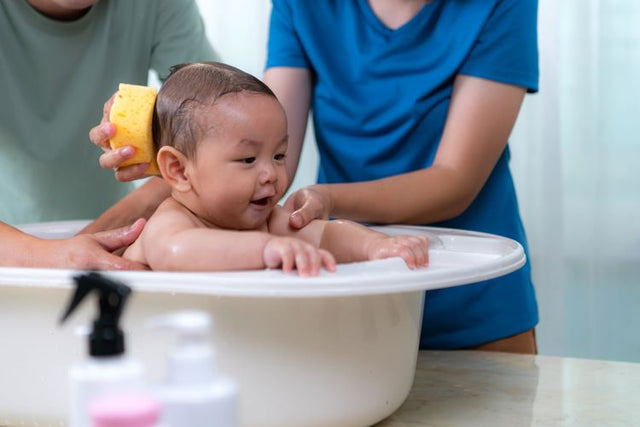The first few times you give your baby a bath can be a bit tricky. Here's a complete how-to guide on your baby's first bath and how to bathe your newborn, read over this list of tips that’ll make the whole process a little easier and safer:
Establish a routine. Your baby’s bathtime routine will help set her body clock, especially if you do it in the evening. Reinforce the sleepy-time message by dimming the lights and keeping the noise and activity down after the bath is over. Of course, it’s fine if another time of day works better for you and your baby.
Check her mood. You should, however, postpone the bath if your baby is hungry, grumpy or has an upset tummy.
Gather your supplies. Have everything on hand since you can never leave your baby in the bath. The essentials include baby soap and shampoo, cotton washcloths, cotton balls, a plush towel or two, and a plastic basin. You may also want a new diaper, a set of clean clothes and diaper ointment or cream for after the bath.
Keep it toasty. Babies lose body heat very quickly — especially when they're naked — so make sure the bathing room is warm enough, a bathroom can be quickly warmed up with shower steam if necessary. You can put a warm washcloth on your baby's exposed parts like her tummy to keep her from getting cold. The water temperature should be warm but not hot, so test it with your elbow or the inside of your wrist to avoid burning your child.
Get a grip. Gently slide your baby into the tub, feet first, holding her securely with one of your arms under her head and the other supporting her bottom. Once she's in, avoid letting her sit for too long in water — it can irritate baby's skin, plus she might get chilly.
Soap up sparingly. You do use soap for a newborn sponge bath, but pick a mild one and focus on her hands and diaper area when you're bathing. You can just use water on the rest of her body most days, unless she's really dirty.
Focus on the face first. Dip a corner of a washcloth or cotton ball in the warm water, and gently wipe one eye from the inner corner outward and then use a different corner or a clean cotton ball for the other eye. Wet the washcloth entirely and wash her face, especially around the mouth and under the chin, and inside and behind her ears. Never use a cotton swab to clean inside your baby's ears.
Wash your baby's body. Dip the washcloth in warm water and wash your little one's neck and torso. Maneuver carefully around the umbilical cord if there's still a stump; it's okay to gently wipe away any crustiness around it. Next, clean under her arms and between her fingers. Be sure to get into those little creases and skin folds.
Use a tear-free baby shampoo. If, of course, she has any hair. If she doesn't, wipe her head with a washcloth. Using water and a tiny bit of shampoo, lather your baby's scalp. Massage it with the pads of your fingers, including the area over the fontanelles on the top of the head. If your baby develops cradle cap, talk to your pediatrician.
Don't force it. If your baby absolutely hates being bathed in the tub, go back to sponge baths for a few days, then try again. She'll get the hang of it eventually.
Stay safe. Never leave a baby alone in or near the tub, and always keep at least one hand on her body at all times. If you’ve forgotten something, you’ll need to take your baby with you to get it or ask your partner, sitter or family member to deliver whatever.





